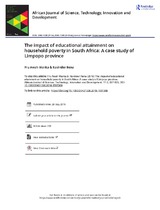| dc.contributor.author | Wanka, Fru Awah | |
| dc.contributor.author | Rena, Ravinder | |
| dc.date.accessioned | 2021-06-15T14:00:17Z | |
| dc.date.available | 2021-06-15T14:00:17Z | |
| dc.date.issued | 2019 | |
| dc.identifier.citation | Wanka, F. A., & Rena, R. (2019). The impact of educational attainment on household poverty in South Africa: A case study of Limpopo province. African Journal of Science, Technology, Innovation and Development, 11(5), 597-609 | en_US |
| dc.identifier.issn | 2042-1346 | |
| dc.identifier.uri | https://doi.org/10.1080/20421338.2018.1557368 | |
| dc.identifier.uri | http://hdl.handle.net/10566/6290 | |
| dc.description.abstract | Poverty is a phenomenon that is multidimensional in nature and its meaning varies from one individual to another (Alkire and Foster 2011; Batana 2013; Bossert, Chakravarty, and D'Ambrosio 2013; Jansen et al. 2015). It can be seen as a failure to attain certain capabilities, absolute or relative,2 or a lack of income to meet a certain standard of living in a given society (Jansen et al. 2015). It can be chronic or temporary3, is often linked with underdevelopment, economic exclusion and vulnerabilities, and sometimes closely correlated with inequality (Mbuli 2008; Van der Berg 2008; Jansen et al. 2015). The definition of poverty employed determines its measurement. | en_US |
| dc.language.iso | en | en_US |
| dc.publisher | Routledge | en_US |
| dc.subject | Educational attainment | en_US |
| dc.subject | Poverty | en_US |
| dc.subject | Human capital | en_US |
| dc.subject | Households head | en_US |
| dc.subject | Limpopo province | en_US |
| dc.title | The impact of educational attainment on household poverty in South Africa: A case study of Limpopo province | en_US |
| dc.type | Article | en_US |

